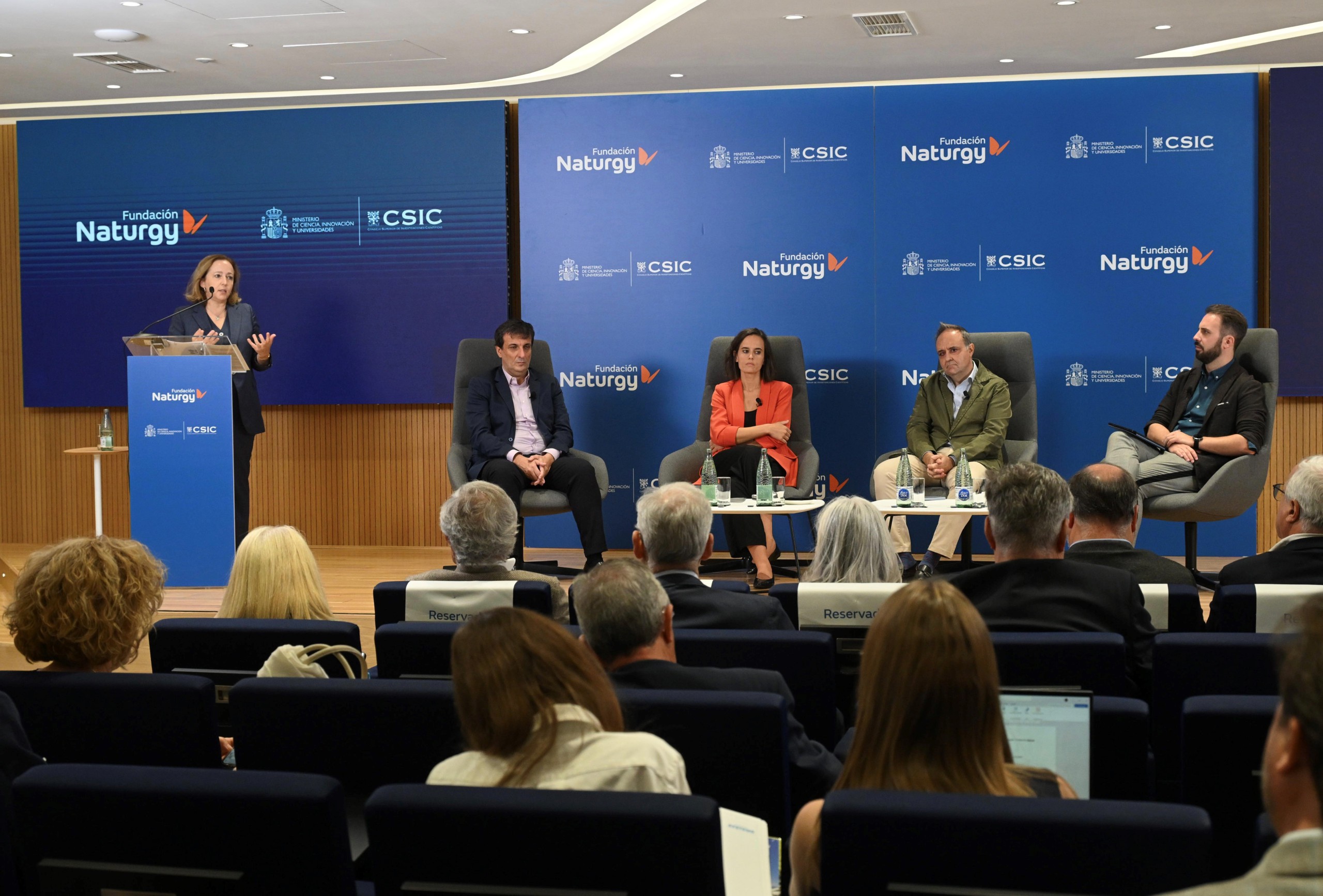Decarbonisation, cost reduction and security of supply: the keys to progress in energy research and innovation
The Naturgy Foundation and CSIC have organised their third conference on ‘Research and innovation in the energy sector’.

Advances in technology and innovation will be key to transforming the energy sector and meeting the ambitious climate targets that have been set. The Naturgy Foundation and the Spanish National Research Council (CSIC) have organised the conference ‘Research and innovation in the energy sector’, in which sector experts have addressed the different challenges faced, the various research projects and promising developments that are being worked on in the world of energy.
During the conference, Sergio Rojas, researcher at the ICP-CSIC Institute of Catalysis and Petroleum Chemistry, made a brief introduction to address current developments in research and innovation in the energy sector, highlighting the growing economic and environmental impact of extreme weather events, the need to strengthen social awareness and promote renewable sources along with alternatives such as biogas, especially in sectors such as maritime and aviation. He also stressed the importance of advancing in CO2 capture technologies, making energy processes cheaper and harnessing the potential of artificial intelligence to accelerate innovation in the energy field.
This was followed by a discussion moderated by Alberto Iglesias, deputy director of Disruptores – El Español, with the participation of Lucía Blanco, deputy director general of Energy Planning and Statistics of the Ministry for the Ecological Transition and Demographic Challenge (MITECO); Jesús Chapado, director of Innovation at Naturgy; and, once again, Sergio Rojas, researcher at the ICP-CSIC Institute of Catalysis and Petrochemistry.
Lucía Blanco commented during her speech that “technological innovation is the driving force behind energy policy, key to accelerating the transition towards a sustainable and competitive model”. The Deputy Director General for Energy Planning and Statistics at MITECO pointed out that “Spain is moving forward with a very solid scientific base and has three key tools: PNIEC, PEICTI and PERTE ERHA, which drive the development of clean technologies and contribute to achieving net zero emissions by the mid-century”.
Jesús Chapado stressed that Naturgy is already working on “developing technologies that optimise biogas production and waste management, guaranteeing increasingly renewable energy with full security of supply. Moreover, we are already succeeding in producing biomethane at reasonable costs, but we need to make further progress on solutions to capture and use CO₂ efficiently”.
“Technology neutrality is an essential principle of the energy transition. We must accompany and monitor the development of each technology throughout its life cycle, promoting innovation, sustainability and adaptation to the customer,” added Chapado. “The key is to maintain a balance between decarbonisation, costs and security of supply, without forgetting the fight against energy poverty. To this end, public-private partnerships are essential. It is very important that the private sector accompanies the public sector so that research being carried out is on concrete challenges, on what the market and the sector demand.
Sergio Rojas stated that “in order to achieve the ambitious decarbonisation objectives in key sectors such as aviation and maritime transport, it is essential to promote the development and implementation of advanced technologies, adapted to the particularities of each project”. “CSIC, through its research centres and initiatives such as the TransEner+ PTI Platform, offers companies the opportunity to collaborate in the creation and validation of these innovative solutions,” he said.
At the opening of the conference, Rafael Villaseca, Chairman of the Naturgy Foundation, stated that “we are attaching increasing importance to scientific and technological research in the energy sector, because that is where a large part of our future lies”. Villaseca also stressed that “the objectives we set ourselves are ambitious, even unattainable if we do not make progress along the lines that have already borne fruit and resolve the challenges that are still pending. The solution undoubtedly lies in research and technological innovation and, in this sense, it is essential to transfer this relevance to the field of decision-making and public knowledge”. “If today we did not have the technological advances achieved in the last two decades, we would be in a truly dramatic situation”, concluded the Chairman of the Naturgy Foundation.
CSIC Chairwoman Eloísa del Pino highlighted the institution’s efforts to focus research on today’s main challenges through actions such as the Interdisciplinary Thematic Platforms, which bring together research staff from different centres to face the same challenge. “In the energy platform we have brought together 237 researchers from 22 centres to address this challenge from different fields and disciplines. These include research into renewable energies, efficient energy storage, decarbonisation, hydrogen and electrification,” she explained.
She also recalled that the CSIC is developing experimental infrastructures aimed at developing new technologies. Among the CSIC projects underway, Del Pino mentioned the test bench for low-temperature fuel cells. She also emphasised that “CSIC is the first Spanish public and private patenting body in the European Union”. “We exploit 20% of our patents ourselves by creating companies, we are already creating 12 a year,” she said.
Share